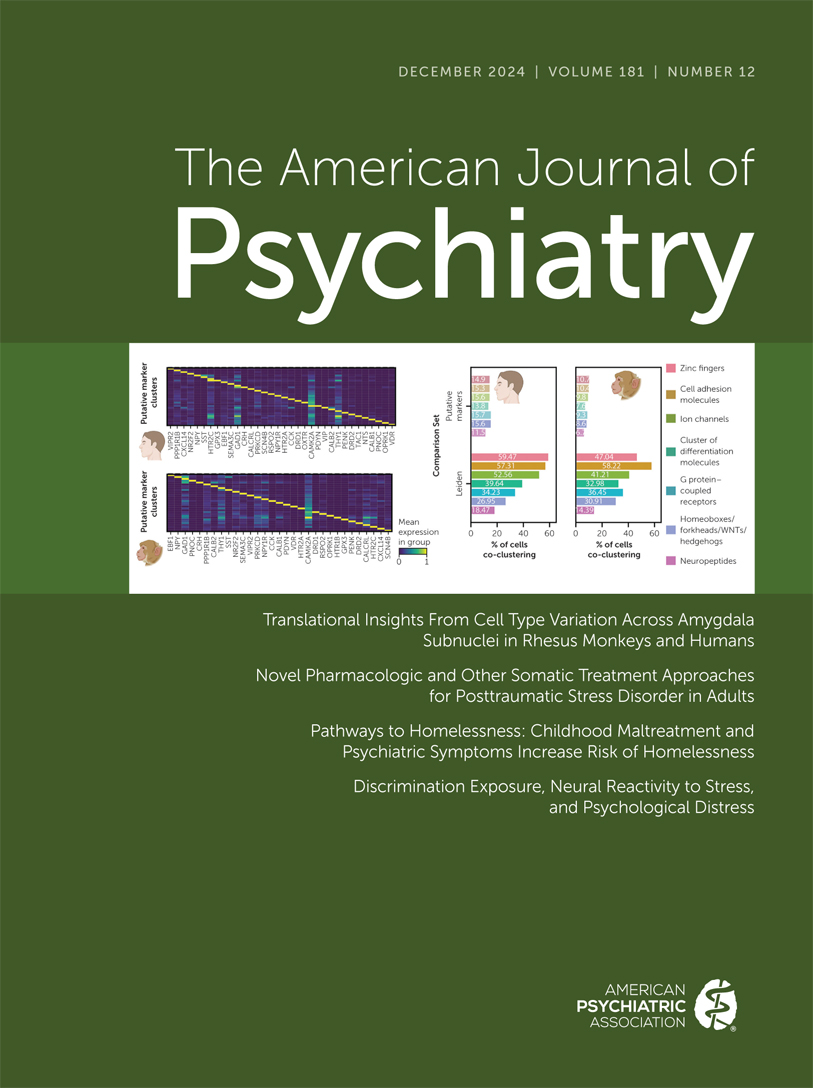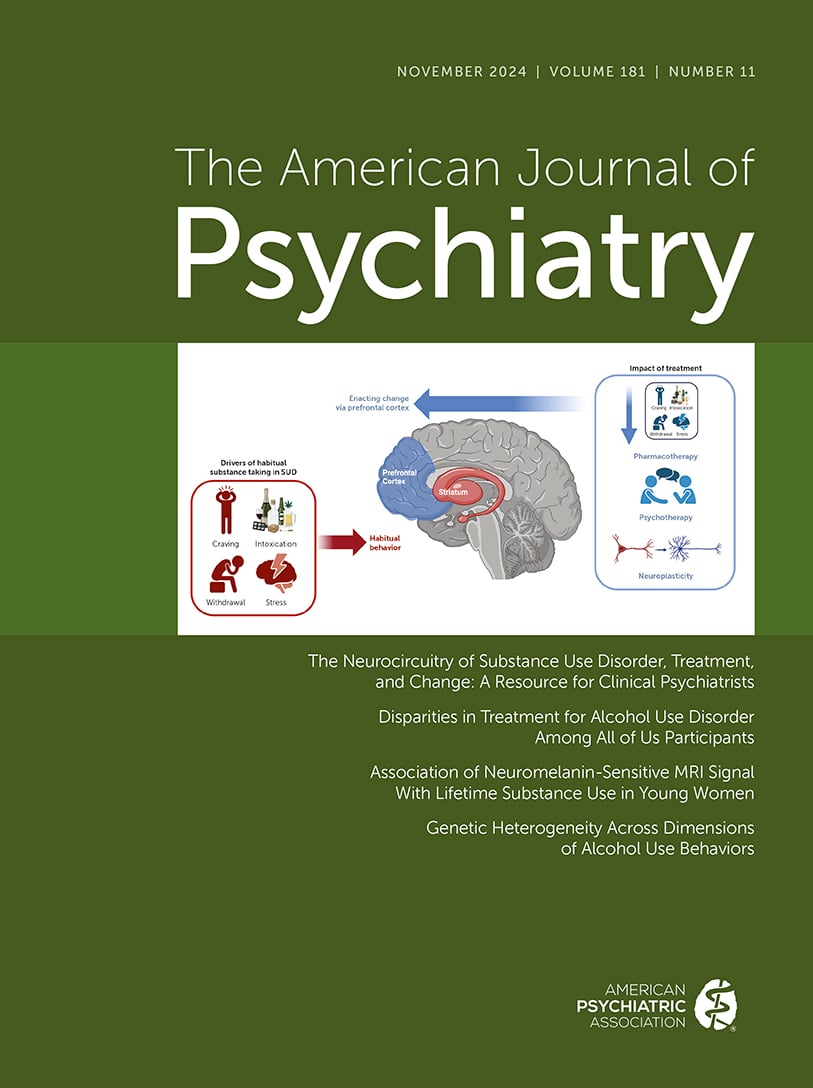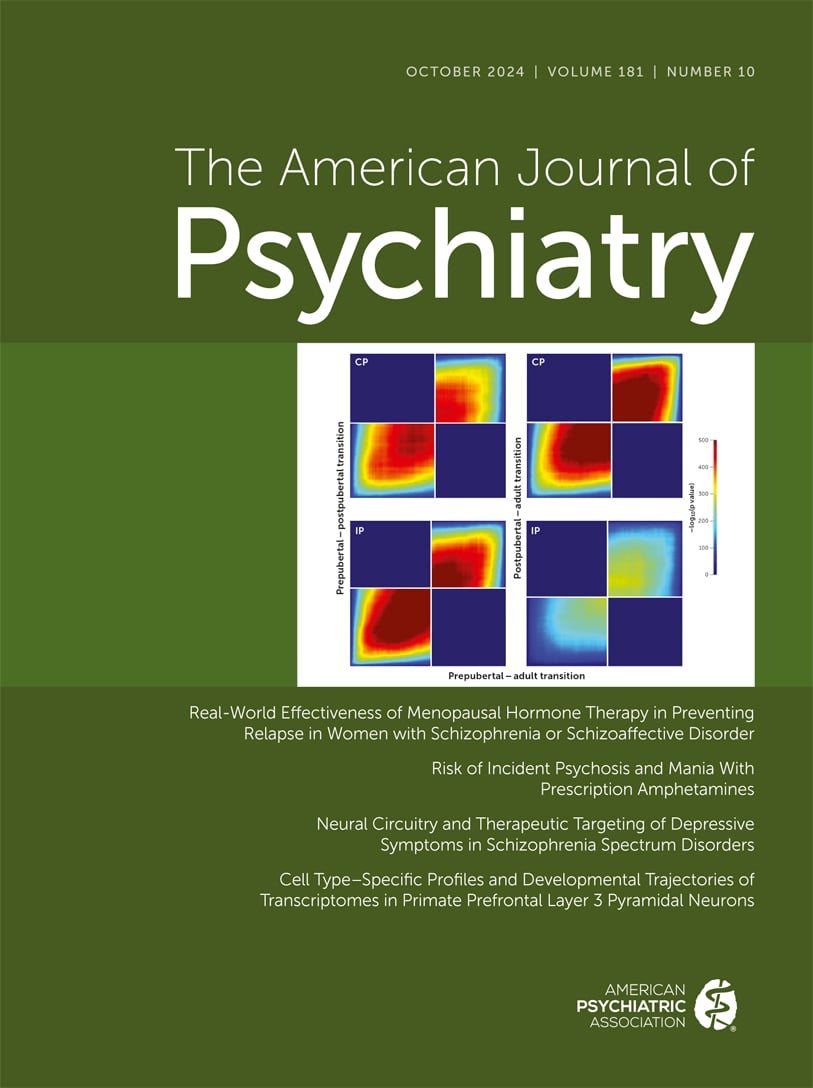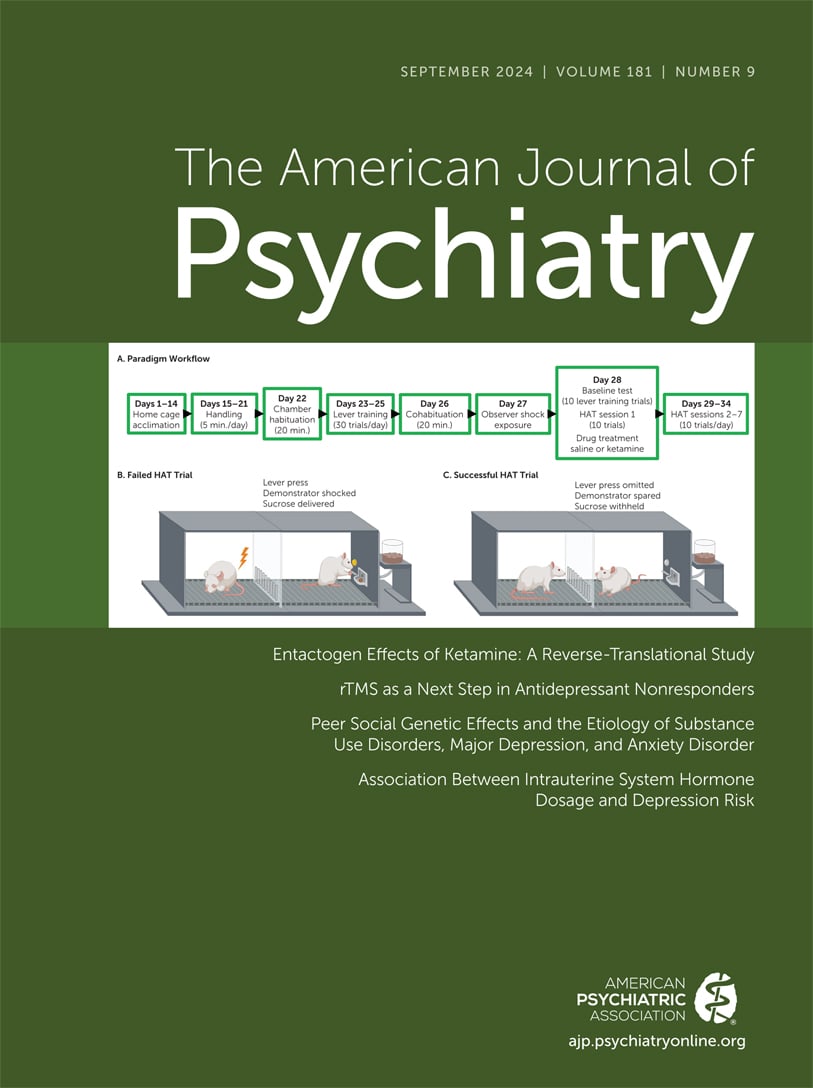American Journal of Psychiatry
- Volume 135
- Number 4
- April 1978
Publication date: 01 April 1978
Pages413–419To function effectively in the medical environment a psychiatrist must be comfortable with the skills and values of medicine. He or she must nurture his or her original knowledge in this area with an ongoing learning program. Certain problems are uniquely ...
https://doi.org/10.1176/ajp.135.4.413Publication date: 01 April 1978
Pages420–426On the basis of a review of the literature describing the process of schizophrenic illness, the authors conclude that schizophrenic psychosis is one stage in a process of psychological and biological breakdown that has a specific structure and a ...
https://doi.org/10.1176/ajp.135.4.420Publication date: 01 April 1978
Pages427–431The author presents a method through which findings from anthropological and cross-cultural research can be applied to problems affecting patient care. The clinical social science approach emphasizes the distinction between disease and illness and ...
https://doi.org/10.1176/ajp.135.4.427Publication date: 01 April 1978
Pages432–436The authors administered a questionnaire to 41 women who had had mastectomies to investigate aspects of the procedure itself, pre- and postmastectomy adjustment, effects on sexual relationships, and the influence of age. Although most women reported good ...
https://doi.org/10.1176/ajp.135.4.432Publication date: 01 April 1978
Pages437–441The author suggests that successful therapy with borderline patients requires the initiation, strengthening, and maturation of the therapeutic alliance as well as the working-through of the patient's difficulty with separation-individuation from the past. ...
https://doi.org/10.1176/ajp.135.4.437Publication date: 01 April 1978
Pages442–447The authors describe five groups of patients who have been found to respond poorly to psychiatric treatment--people from lower socioeconomic groups, juvenile delinquents, drug-addicted individuals, alcoholics and military psychiatric patients. Although ...
https://doi.org/10.1176/ajp.135.4.442Publication date: 01 April 1978
Pages448–451Of 367 respondents to a survey of Asian-American members of the American Psychiatric Association, fewer than 16% were American-born U.S. medical graduates, and 41% of the patients treated by this sample were minority group members. These findings have ...
https://doi.org/10.1176/ajp.135.4.448Publication date: 01 April 1978
Pages451–453Asian physicians represent a growing majority among foreign medical graduates practicing psychiatry in the United States. The training of this group requires continued study and planning. Particular attention should be given to curriculum enrichment ...
https://doi.org/10.1176/ajp.135.4.451Publication date: 01 April 1978
Pages454–456The authors describe some of the sociocultural factors (e.g., moralistic, religious, psychological, and familial characteristics) that influence the help-seeking behavior of Chinese psychiatric patients in North America. They propose a replicable approach ...
https://doi.org/10.1176/ajp.135.4.454Publication date: 01 April 1978
Pages457–458The author cites statistics which show that Asian-Americans underutilize mental health services. He suggests that more research is needed regarding the effects of such mental health delivery factors as language difference, familial reaction, community ...
https://doi.org/10.1176/ajp.135.4.457Publication date: 01 April 1978
Pages459–462The authors point out that new findings in psychiatric genetics and psychopharmacology support the heterogeneity of psychiatric disorders. They present data on the current rates of specific psychiatric disorders, using a recently developed diagnostic ...
https://doi.org/10.1176/ajp.135.4.459Publication date: 01 April 1978
Pages463–466Offspring of psychiatrically disturbed and normal biologic parents, adopted away at birth, were followed up as adults. The psychiatric status of the adoptees was determined by adoptive parent and adoptee interviews. The incidence of depression was ...
https://doi.org/10.1176/ajp.135.4.463Publication date: 01 April 1978
Pages467–469The authors treated 16 depressed patients with up to 90 mg/day of phenelzine. After acetylation phenotype was determined and platelet monoamine oxidase (MAO) activity measured, no significant relationship was observed between clinical improvement and ...
https://doi.org/10.1176/ajp.135.4.467Publication date: 01 April 1978
Pages470–472The authors treated 19 depressive inpatients double-blind with a mean dose of 78 mg/day of phenelzine for 3 weeks to determine the possible relationship between monoamine oxidase (MAO) inhibition and the effectiveness of phenelzine. Clinical ratings made ...
https://doi.org/10.1176/ajp.135.4.470Publication date: 01 April 1978
Pages472–475The authors used data from an earlier nonblind study to identify 16 autistic-type child outpatients who had apparently improved when given vitamin B6 (pyridoxine). In a double-blind study each child's B6 supplement was replaced during two separate ...
https://doi.org/10.1176/ajp.135.4.472Publication date: 01 April 1978
Pages476–479Despite repeated treatment failures, some individuals seek bite correction from a succession of dentists. Their pathological narcissism focuses on their bite, in a manner reminiscent of phantom limb phenomena. The dentist's diagnosis and treatment are ...
https://doi.org/10.1176/ajp.135.4.476Publication date: 01 April 1978
Pages479–482Of New York psychiatric facilities surveyed, 83% used ECT. Five percent of patients in university and private nonprofit hospitals, less than 1% in public hospitals, and 21% in private for-profit hospitals received ECT. Practices and procedures were ...
https://doi.org/10.1176/ajp.135.4.479Article
Article
Article
Article
Article
Article
Article
Past Issues
View Issues Archive
Vol. 181 | No. 12

Vol. 181 | No. 11

Vol. 181 | No. 10
